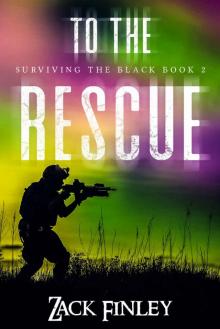- Home
- Zack Finley
Breckinridge Valley: Surviving the Black--Book 1 of a Post-Apocalyptical series Page 26
Breckinridge Valley: Surviving the Black--Book 1 of a Post-Apocalyptical series Read online
Page 26
We brought several ninjas with us at the museum, just in case the water expedition picked a different location and we needed to relocate. I wondered how many people remaining in town remembered the museum pump. It was indeed something worth sharing once the justice center was cleared.
We settled down to wait. In the rain.
It was only an hour before the group monitoring the justice center reported new activity. Two armed men in SWAT tactical gear left through the door nearest the woods. This was the same door used by the first patrol. We let them pass with a tail, to ensure they weren’t up to something we hadn’t anticipated.
The pair from the justice center made a beeline for the maintenance yard office, not even making basic checks for any surveillance. They opened the maintenance office door with a key and rummaged inside for a few minutes.
The sound of a heavy diesel pickup starting echoed throughout the area. It was a reminder of how quiet things were following the crash. All teams went to full alert. My men would kill them to prevent those two from leaving the area.
Luckily for the hostages, the truck drove straight back to the justice center, parking in front of the same jail entrance where the woman’s body lay.
The two men jumped out of the cab, leaving the engine running. This precipitated a stream of people bringing an eclectic array of empty containers from the jail to stack at least two high in the back of the truck. Three women and three older boys carried most of the containers. The two shooters shouted for them to hurry, but didn’t help do any of the work.
Once the containers were loaded, the two shooters jumped into the truck cab and took off toward the museum with the women and boys following on foot.
“I didn’t get a glimpse of anyone else in the jail,” Craig said over the radio. “They are either staying back or are somewhere else.
I couldn’t have asked for a better scenario, starting off with the shooters arriving before the hostages.
The truck parked next to the pump, with the two shooters sitting in the cab, waiting for the hostages to arrive. The men were distracted by the rain and their windows fogged over quickly. I gave the signal. Two teams opened the pickup doors and dragged the men out.
They never got a chance to bring up their weapons. We waited out of sight for several minutes until the hostages arrived. My men stayed out of sight until we were sure nothing could be seen from the jail building. We were prepared to tackle the hostages to keep them from scattering but, they stopped immediately when confronted.
We dumped enough water containers to allow all of us to proceed under cover to where Roger was waiting with the three deputies.
All three deputies agreed to the plan. My dad tried to excuse the man who’d lost his son and wife, but the man refused. He feared for his daughter and ached for revenge. The deputies spoke with the hostages, and for two of the deputies, it was a tearful reunion with members of their families.
It was only after the reunion they admitted my dad’s instinct was correct. The fourth man they were captured with was closer to Allen than the rest. All three deputies were now eager to get the remaining hostages out. All three still had family inside. That was one of the ways Allen kept everyone under control, keeping at least one member of each family inside the jail complex at all times.
Allen told them if they tried to leave, any family member left behind would be abused and eventually killed.
We learned that even with the failing electricity the group hadn’t changed their routine. The deputies hoped to get to the courtroom silently and get everyone to leave out the eastern door. Most of the women who handled the cooking went on the water run, so it was very possible most of the hostages could be freed without confrontation.
If the deputies saw any of their fellows, they hoped to recruit them. The deputies felt any deputy or corrections’ officer with family being held hostage would welcome a rescue.
The deputies verified that all the exterior doors were locked. If we wanted to break in silently, our best bet was through one of the ground floor windows. Once we had someone inside, they unlocked the exterior door to let the rest of us in.
The deputies told us no one in the sheriff’s office had keys for any of the court offices. That wasn’t a concern as there was plenty of room for the deputies in the sheriff’s offices and jail area.
The sheriff’s office had keys for the courtrooms, mainly because deputies served as court bailiffs.
If a room were locked, we’d leave it. Even with a few guys really good at picking locks plus an assortment of breaching tools, opening them would waste time. That was what crazy glue was for. A few drops of glue and even if a bad guy were hiding in the room, they wouldn’t sneak up on us from the rear.
We sent the three deputies ahead, as we moved deliberately through the corridor, checking open rooms as we went.
We got to the door on the court side just as a parade of women and kids came toward us. I detached two men to keep them tight to the outside wall and out of view from any of the jail areas. Two of the deputies carried small children.
The deputy who already lost his wife and son wasn’t with them. The man’s daughter was still in the jail, and he refused to leave without her. We learned that most of the hostages were now safe. We let our folks know the last easy hostage had left the building.
We leapfrogged forward, checking and clearing rooms, or gluing them shut. When we got to the courtroom where the hostages came from, it got complicated. Too many doors, leading too many places.
We only cleared three of the exits when the sounds of gunshots pierced the quiet. The shots were coming from the sheriff’s area of the building. I knew it must be the deputy who lost nearly everything going up against Allen and his crew. Knowing the deputy only carried a pistol, I doubted he would last long enough for us to reach him, but I knew we were obligated to try, anyway.
I told myself they wouldn’t be expecting us.
As we moved toward the sound of gunfire, two men ran out the sheriff’s back entrance. They didn’t have rifles, so our team allowed them to get some distance from the door before engaging.
Craig splashed a shot in front of the running men. Showing some element of caution, they dropped to the ground and looked around for the shooter.
I trusted my team to deal with those men, I was just glad Allen was down another two shooters.
The gunfire in the jail area continued. We were still moving toward the sounds through an area of the building showing more and more signs of habitation. We switched to our NVGs as less and less outside light penetrated this area. Occasionally we spotted a flickering small votive candle, but they were few and far between.
We moved forward purposefully and deliberately. We might be attempting a foolish rescue, but I didn’t want to lose any men doing it. We lined both sides of the hallway, alternating entries.
The shooting stopped, and we couldn’t hear any more from the jail area.
Then we found her, a little naked girl, her foot handcuffed to a desk. She was curled up on the floor. She was beaten and brutally raped. I fought back the blinding rage that filled me.
Then I noticed she wasn’t dead. She was breathing shallowly. We surged into action, covering her with a parka and calling for the doctor to meet us. Tom knelt by her side, doing what he could. She flinched whenever he touched her. He offered her some water, but she refused.
He consulted with Dr. Jerrod, who was waiting at FOB Zulu. She was already on the move toward us. She recommended, leaving the child some water and leaving her alone.
I posted a guard outside the door with a set of handcuff keys to await Dr. Jerrod’s arrival. There wasn’t much we could do until we removed the shooters.
I needed to regain focus, and my men needed to do the same. I barely regained my own control when I noticed the natural leaders in the team were already spreading a deadly calm. Everyone rechecked their weapons and took a deep breath before returning to their positions in the corridor.
I
had never been prouder of my fellow Rangers. Professional and deadly.
We reached the last exit before the jail and brought the crew watching that door into the building. I told them to get the girl to safety and then finish clearing the main corridor, to keep us from getting flanked.
My team kept moving toward the jail.
Roger came on the radio and advised there were at least five women and children remaining in the building, including the girl we just encountered. Dr. Jerrod and her nurse were standing by to receive the girl and any other wounded. The two men just captured exiting the building confirmed the remaining eight shooters were hardcore. They also provided details about where the gunmen were holed up and where the last hostages might be.
Our main force moved to prevent Allen’s men from leaving the jail area, where we now believed they were holed up. The rest of my team moved purposefully through the corridors and offices to verify the rest of the building was empty.
It took a solid hour before we declared every area but the jail, clear. In the process, we located most of the material the deputies collected from Huntsville businesses. The main courtroom was stacked high with the rest packed into offices and corridors at the sheriff’s end of the building.
Roger arrived with a hand drawn layout of the jail area and the two living deputies, Jake and Brian, who helped rescue the hostages. They weren’t being restrained, but I noticed their holsters were empty.
The jail was a complicated warren with the inmate areas in the core and the guard areas behind seriously heavy glass and steel. The inmate areas had two stories with an open floor plan allowing observation from nearly every angle. The tables were stainless steel mounted to the floor served by steel seats that would be fitting in a child’s play area. Some of the inmates slept in dorm-like settings with bunk beds and others in secure cells.
Most of the electronic locks were set in the open position after the inmates were removed from the jail before the solar storm. None of the guards wanted to risk being locked in during any subsequent power fluctuations.
We were told to expect plenty of light throughout the jail, provided by kerosene camping lanterns. There were a lot of fuel cans available to keep these lit and to provide fuel for cooking stoves. The temperature was already getting chilly in the building after more than a day of no electric heat.
Brian and Jake recommended we capture the master control center and then power it up with the generator. The control center cameras would give us intel throughout the jail, and we could then close all automatic doors to limit Allen’s mobility.
“Why didn’t you hook up the generator when we cut the solar?” I asked.
“We screwed up,” Brian said. “Someone left the generator running at the fuel depot until it ran out of fuel. Allen didn’t want to leave it there overnight, so we pulled it up next to the jail. We intended to take it back to fuel up the next morning and refill everything. You guys put a monkey wrench in that.”
We needed to capitalize on our good luck.
We set up shop in the booking section, then cleared the kitchen area and laundry. Some of the frozen foods Allen took from the middle school was stored in the jail freezers. They must have left the freezers closed because the food was still cold. The refrigerators were unplugged. A pair of camp stoves had apparently been their main cooking area after the natural gas depressurized. The kitchen area was filthy; apparently, nothing was cleaned since the solar flares. Jake confirmed they had abandoned the current kitchen due to the filth and set up a new cooking area in pod one.
I sent Brian with a team to the main electrical, with orders to isolate systems to allow us to restore power very selectively.
After a few minutes, they told me they needed building schematics and two men headed for the building maintenance offices to look for some.
The team I assigned to clear the jail secured the visitation area and small clinic. Once they secured the main control center, I had them set up a defensive position with a view down both main jail corridors. I was uneasy about the number of open doors leading into the jail proper. Many were originally sally ports, but now they were just hallways with doors open at both ends.
I didn’t object when three guys left to get sandbags from the road maintenance area to beef up the defensive position. Force Beta and about half of Force Gamma were now in or around the justice building.
Steve and one of his solar technicians showed up soon after the group left for sandbags. He heard we were having trouble with the building’s electrical system and came to help. Steve installed the solar panels several years before, so this wasn’t the first time he accessed the electrical system. I briefed him on what I wanted to do and asked him to run the electrical restoration for me.
I hated the delays but knew we probably only had one shot to free the hostages and avoid getting shot up in the process. Basically, I wanted to restore power to the master control, cameras and electronic doors. The deputies we captured confirmed the sheriff made them disconnect power from the building before the solar event, so I hoped the electronics weren’t scrambled. They also confirmed that no one had turned the system back on since the crash, in part because it was a power hog.
Steve thought one generator would provide enough power for the reboot, cameras, and jail doors if we cut off all other power draws. I told him to isolate every other system.
We also didn’t want to alert Allen’s men we were restoring the control system until we initiated a lockdown. I wanted to keep them locked down and isolated, if possible, away from the hostages. Even if we weren’t entirely successful, limiting their mobility would be beneficial for the ultimate takedown.
It would help if Allen still thought this whole mess was an in-house revolt. Allen might even be relieved to have fewer people to feed, though the loss of the Humvees had to hurt. He had plenty of weapons, ammo, and supplies to recruit replacement shooters who shared his antisocial tendencies.
In the early days of the crisis, the sheriff’s department was a civilizing force. The deputies tried to help their community, but after the murder of Deputy Jenson, they changed. When Sheriff Lewis collapsed, it paved the way for Allen to take charge. My dad thought Allen was a sociopath before the shit hit the fan. Now he was murdering scum.
We were lucky Allen hesitated to take over until he was sure the government wasn’t coming to the rescue. If he’d ditched the deputies and teamed up with the Lloyd Mountain Militia right after the power went down, the valley might have been at risk.
I wasn’t ready to recruit any of the deputies to live with us in Breckinridge valley, but I understood how they got trapped between taking care of their families and doing what was right. Allen hadn’t scrubbed the last semblance of civilization from them, yet. At the middle school, Allen relied on his criminal confederates to do the wet work. It gave the deputies a fig leaf to hide behind. But that didn’t help the civilians living in the middle school.
I didn’t know where those civilians were or even if they were still alive. The men who knew were somewhere in the dark jail before us. This speculation was a distraction, and I set it aside, focusing my thoughts on what Allen might do.
If he still felt in control of the situation, he would keep the hostages alive. I doubted Allen would kill his last remaining bargaining chips without cause. After all, he needed someone to do the grunt work. Brian and Jake confirmed the earlier report that the men left in the jail were hardcore.
The remaining hostages were kin to the men sent out on the water foraging team. The little girl we found was the daughter of the deputy who stormed the jail. Brian told us the deputy only went berserk when his daughter wasn’t in the courtroom with the other women and kids.
Leaving Allen and his cronies unchecked could put us all at risk. As much as I just wanted to go home to confirm my daughters were okay, we couldn’t leave these rats holed up in such a strategic position. I couldn’t abandon the hostages without trying to free them. I owed it to the boy I saw gunned down in
front of me. Even rescuing the hostages wouldn’t even the score. I felt dirty.
I wanted to get the master control center back online before Allen sent someone to investigate.
Steve sent Brian and Jake to the control center to help boot the system back up. I wanted both deputies there in case of glitches and to help us interpret what we saw. I was relieved when they confirmed the cameras gave no visible clues when active. They looked the same with or without power. That could allow us to locate our shooters and our hostages before they knew they were being surveilled.
The computer controls had a full lockdown protocol. Our main problem was that most automatic doors to the main living areas were blocked open according to Brian and Jake. Access to most secure areas of the jail involved sally ports, with an outer and inner door. We needed to remove the blockage from the outer doors so we could lock the areas down.

 To the Rescue; Surviving the Black--Book 2 of a Post-Apocalyptical Series
To the Rescue; Surviving the Black--Book 2 of a Post-Apocalyptical Series Dire Prophecy
Dire Prophecy Duchy Unleashed
Duchy Unleashed Mad Toffad's Keep
Mad Toffad's Keep Breckinridge Valley: Surviving the Black--Book 1 of a Post-Apocalyptical series
Breckinridge Valley: Surviving the Black--Book 1 of a Post-Apocalyptical series Bittersweet Homecoming; Surviving the Black--Book 3 of a Post-Apocalyptical Series
Bittersweet Homecoming; Surviving the Black--Book 3 of a Post-Apocalyptical Series